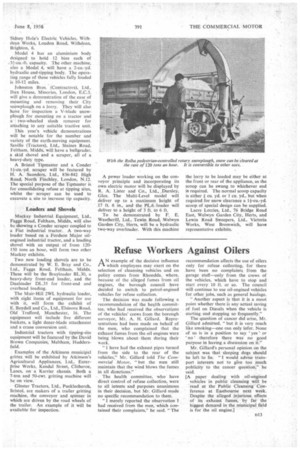Refuse Workers Against Oilers
Page 67

If you've noticed an error in this article please click here to report it so we can fix it.
AN example of the decisive influence which employees may exert on the selection of cleansing vehicles and on policy comes from Rhondda. where, because of the alleged fumes from oil engines, the borough council have _ decided to switch to petrol-engined vehicles for refuse collection.
The decision was made following a recommendation of the health committee, who had received the observations of the vehicles' crews from the borough surveyor, Mr. A. H. Gillard. Representations had been made on behalf of the men, who complained that the exhaust fumes from the oil engines were being blown about them during their work.
" 1 have had the exhaust pipes turned from the side to the rear of the vehicles," Mr. Gillard told The Commercial Motor, "but the men still maintain that the wind blows the fumes in all directions."
The health committee, who have direct control of refuse collection, were to all intents and purposes unanimous in their decision, but Mr. Gillard made no specific recommendation to them.
"I merely reported the observation I had received from the men, which contained their complaints," he said. "The recommendation affects the use of oilers only for refuse collecting, for there have, been no complaints from the garage staff—only from the crews of the vehicles, which have to stop and start every 10 ft. or so. The council will continue to use oil-engined vehicles for other jobs, such as general haulage.
" Another aspect is that it is a moot point whether there is any actual saving of fuel on Diesels when the vehicle is starting and stopping so frequently."
The question of cancer did arise, Mr. Gillard admitted, " but it is very much like smoking—one can only infer. None of us is in a position to say ' yes ' or ' no ' therefore there was no good purpose in having a discussion on it."
Mr. Gillard's personal opinion on the subject was that sleeping dogs should be left to lie. "I would advise transport interests not to give too much publicity to the cancer question," he said.
[A paper dealing with oil-engined vehicles in publie cleansing will be read at the Public Cleansing Conference at Eastbourne next week. Despite the alleged injurious effects of its exhaust fumes, by far the biggest demand in the municipal field is for the oil engine.]




















































































































































